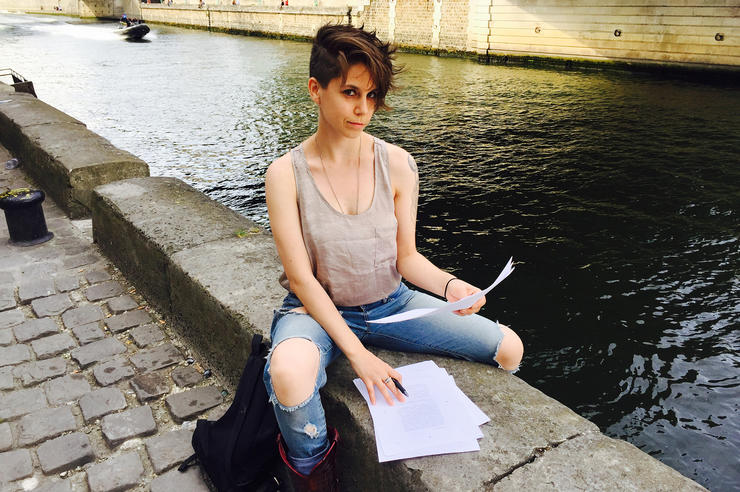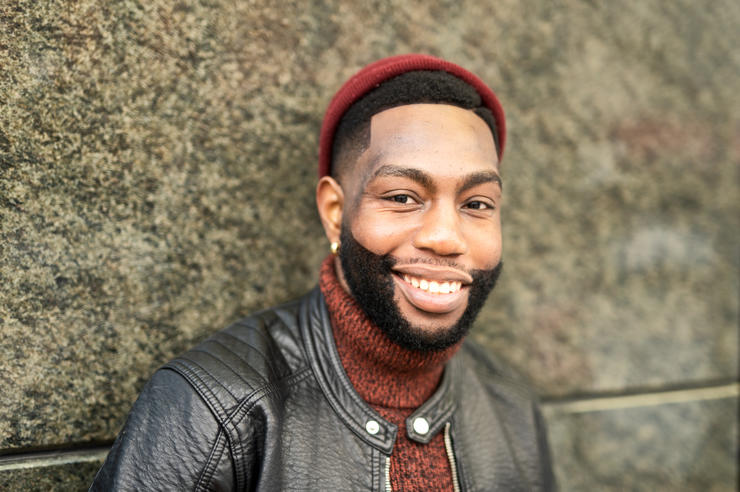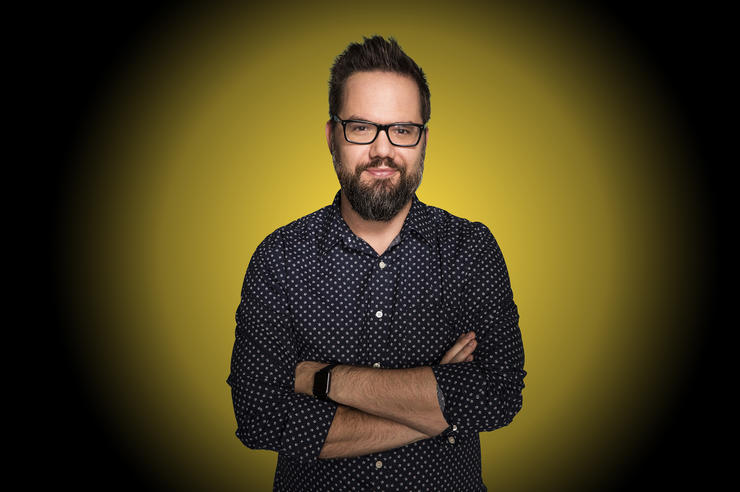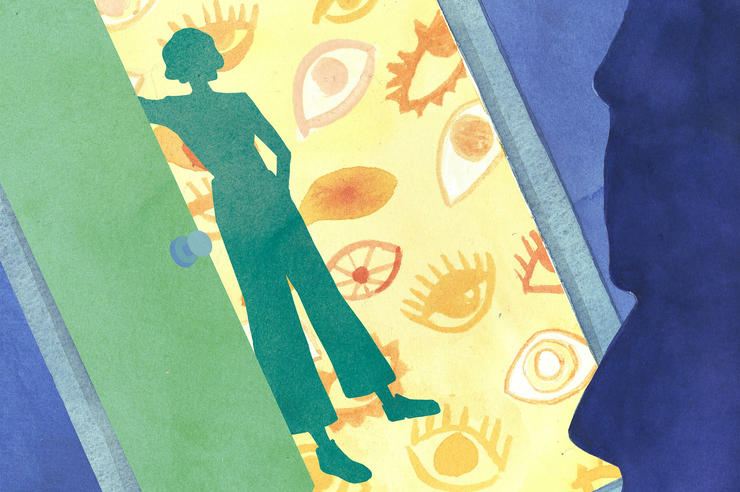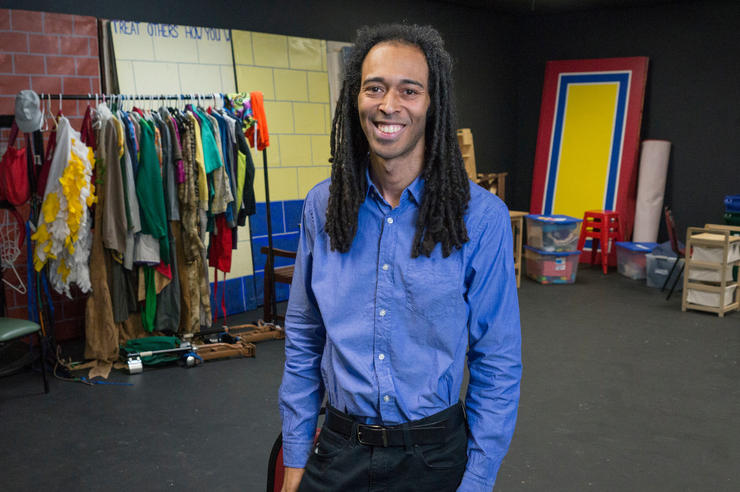At Iowa, playwrights see their words become productions
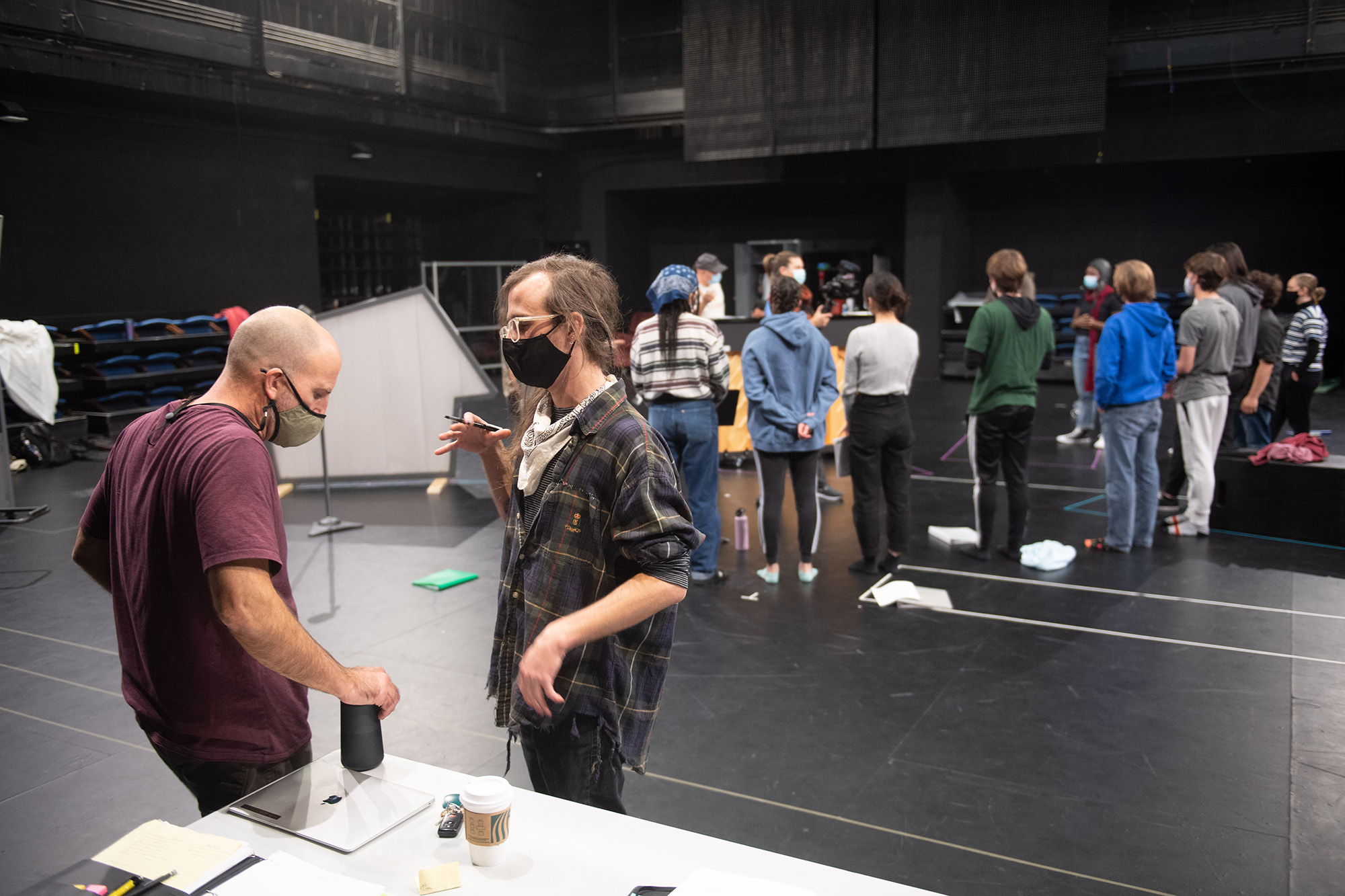
Iowa Playwrights Workshop graduate Dakota Parobek (foreground, right) speaks with director Paul Kalina on the set of Smile Medicine, written by Parobek and part of the University of Iowa’s Mainstage 2021-22 theater season.
In spring 2019, the Iowa New Play Festival’s reading series included first-year Iowa Playwrights Workshop student Dakota Parobek’s Smile Medicine.
Two-and-a-half years later, the University of Iowa Department of Theatre Arts will feature Smile Medicine in its E.C. Mabie Theatre, the first time in at least 20 years that a recent graduate’s work has been produced as a mainstage production.
“I was just blown away that my play would come to mind for them and that it was chosen,” says Parobek, who graduated in spring 2021, about the season selection committee. “I feel lucky. It always feels like a fluke that you get selected for anything—even the fact that I got into this program. It’s a bit of impostor syndrome, and it never goes away.”
Dakota Parobek began working on Smile Medicine eight years ago as an undergraduate at Columbia College Chicago. An early version of the play served as one of two of their writing samples when they applied to the Iowa Playwrights Workshop.
“It was the first play where I feel I found my voice as a playwright. It was the first thing that I was really proud of,” Parobek says. “An unintuitive thing about writing is the importance of taking time away from a thing and coming back with fresh eyes.”
The Iowa New Play Festival’s staged reading of Smile Medicine in 2019 wasn’t performed in the Theatre Building but in Danforth Chapel in Hubbard Park, where Parobek played piano to accompany the reading.
The 2021 graduate of the workshop has returned to the play once again. Smile Medicine will be produced as a fall 2021 mainstage production in E.C. Mabie Theatre.
“It’s wonderful being in the room and hearing actors’ specific voices,” Parobek says. “I get kind of granular with lines and verbiage. I’m really specific about the sonic quality of language, and many times I know the rhythm of the line, I know the syllables, but I don’t know what the words are yet. That’s really inflected by the specific actors.”
Along with being inspired by their collaborators on stage, Parobek also cites two plays for influencing Smile Medicine: Jenny Schwartz’s God’s Ear and Young Jean Lee’s Lear.
“If you see Smile Medicine, you’ll see how deeply God’s Ear rattled me and changed how I thought about language and language on stage,” Parobek says. “And Young Jean Lee’s use of, for lack of a better word, collage like a Sesame Street scene appearing, that was a huge impetus to have Peanuts characters colliding with Russian space programs and things like that.”
Parobek says they always have an eye toward what their play is going to do in the world and what its function will be.
“A play’s capacity to make change is fairly limited, but it’s something I always strive for,” Parobek says. “I always orbit mental illness and being frank about it—not necessarily teaching people what it is like to feel that way but to make space for those who are already in that place. And to carve out a space to find humor even in the depths of sadness and remind us that there’s hope and joy that can be found there.”
While most graduates of the Iowa Playwrights Workshop won’t see their work on the main stage so soon after graduating, they are assured of leaving Iowa City having several of their plays produced in one form or another.
“That’s when you really learn how to be a playwright: when you’re in the room working with directors and actors and problem-solving. Collaborating—that’s the good stuff,” Parobek says. “Knowing I’d get to do that was a huge deciding factor and what made me feel really safe about applying to Iowa. Because I knew that was valued.”
Over three years, workshop students’ writing is nurtured through coursework and opportunities to present their efforts at all stages of development. Art Borreca, associate professor, co-head of the Playwrights Workshop, and co-head of dramaturgy, says Iowa stands out in this regard.
“In some programs, you might get one production: your thesis play in your third year,” Borreca says.
Iowa’s strong playwriting tradition dates back to the early 1920s, with the Playwrights Workshop officially being founded in 1971. Its goal is to help playwrights develop their unique voices in an environment that allows experimentation in process and form.
Borreca says Iowa, as one of the most highly regarded programs in the country, consistently attracts talented playwrights.
“A majority of students have had readings of plays at professional theaters, and some have had productions,” Borreca says. “Their focus for joining the workshop is really to have time to develop their work. Some also are interested in the options that the degree gives them in terms of teaching, for example. But most aspire to a professional career as a writer in theater or film or television.”
Parobek grew up in Louisville, Kentucky, and discovered playwriting in their teens. When Parobek was 17, the New Voices Young Playwrights Festival presented by the Actors Theatre of Louisville selected their 10-minute play as one of several to produce during its annual event.
“It was my first taste of actually having a play produced, and I knew I wanted to do this with my life,” Parobek says.
After graduating from Columbia College Chicago, Parobek worked for theater companies around the Windy City and spent a summer in India. When they started thinking about graduate school, they remembered that their former professor, Lisa Schlesinger, had returned to Iowa, where she earned MFAs from the Playwrights Workshop and Iowa Writers’ Workshop, to become an associate professor and co-head of the Playwrights Workshop.
“I visited during the New Play Festival and saw Nina Morrison’s play Ibsanity and thought, ‘Oh yeah, I need to go here,’” Parobek says. “They were doing all these weird, funny, just insane things, and I thought if they can do that stuff here, this is the right place to be.”
Ikram Basra wasn’t known as a playwright when he came to Iowa. In fact, he first visited Iowa City from his native Pakistan to participate in a poetry reading. While the former journalist also had done some screenwriting for Bollywood, he had limited theater experience.
“I didn’t have a rich theater background, but I had a lot of stories,” says Basra, who will graduate from the Playwrights Workshop in December 2021. “This place is famous across the world for writing. And it’s famous for writing because of people like Art Borreca who work day and night listening to all kinds of ideas that we bring and helping us learn how to shape them and make something out of them.”
Those ideas often see their first light of day in the Playwrights Workshop course, where students present work and receive feedback and support from fellow playwright and dramaturgy students and faculty.
“There’s a kind of unconditional respect that is a part of being at that place and hearing this new budding idea,” Parobek says. “The plays that are presented are in every stage of the development, from almost done, barely a play, or being held together with shoestrings and stuff.”
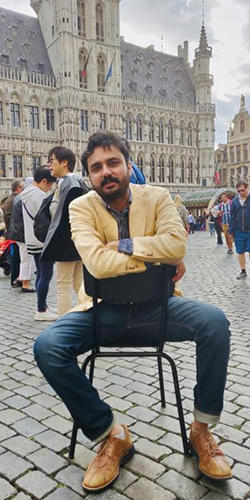
“This place is famous across the world for writing. And it’s famous for writing because of people like Art Borreca who work day and night listening to all kinds of ideas that we bring and helping us learn how to shape them and make something out of them.”
Playwrights are encouraged to be supportive during workshop feedback sessions.
“The focus has always been on not prescribing what the work should be, but instead trying to help make it the best version of what it is,” Borreca says. “So, the feedback is geared not toward, ‘You should fix this,’ ‘You should make this shorter,’ ‘You should cut this character.’ The feedback is, first of all, focused on what is working. Then asking questions. ‘What does everyone see?’ ‘What most engaged them?’ And then asking questions such as, ‘I was curious about this character. Why did this character disappear for a stretch of the play?’ But not saying, ‘This is a problem that you have to fix.’”
While there are some playwright programs in which the feedback likely is a little more prescriptive, Borreca says the trend is leaning more toward what Iowa has long been doing.
“This kind of environment is really the best place for new work to prosper,” Parobek says.
Experimentation also is encouraged and supported during classes.
Basra says after mentioning a poem he wrote, Borreca suggested he rework it as a play.
“He thought the poem had good bones and structure. And the very next year I was able to see that play produced right in front of me,” Basra says. “It was a fascinating experience for me to see how something you carry with yourself as a writer in your mind has legs and can go anywhere if you just allow yourself, and if you have proper mentorship.”
Along with playwriting courses, students also take courses in screenwriting and writing for television.
Borreca says students are getting more training than they used to in writing for film and television, and they’re leaving with samples of work that they can submit to agents or producers.
“The opportunities to write for film and for television are greater for a playwright than they used to be,” Borreca says. “Going back 50 years, the idea was that if you were truly a playwright, writing for film was somehow selling out. That’s just not the attitude anymore. If you watch these series on Netflix or Hulu or another streaming service, you’ll often see the name of a playwright in the screenwriting credits. And the writing is very good, and informed by training and experience in writing for theater.”
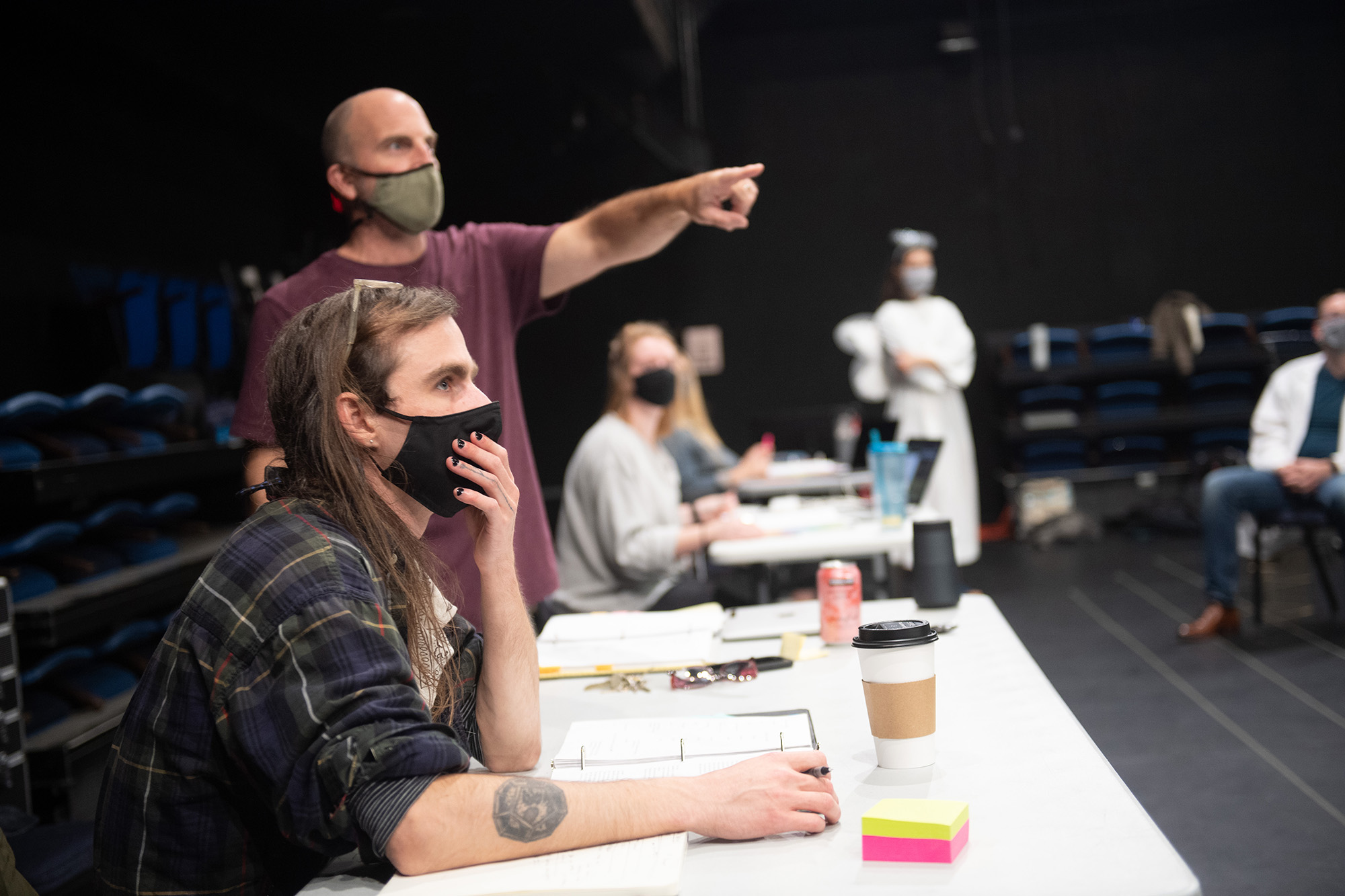
A playwright student’s first chance for a work to be produced at Iowa is often a reading at the New Play Festival. While not full productions, these are staged readings with actors, a director, and a dramaturge. Second-year playwright students get a production in the department’s Gallery Series, and third-year students get a production in the New Play Festival.
While developing a script from a reading to a full production is the traditional way to go, that doesn’t always work out.
“They’re writers, so they often change direction no matter how carefully you lay out the opportunities for any given script to progress in a particular way,” Borreca says. “It’s not unusual that we’ll choose a script for a reading or production and a month later they will say, ‘I’ve written this new thing that I’m a lot more excited about.’ And we always say yes because we want them to work with the thing that they’re most excited about. That’s just the natural creative process.”
While some playwriting programs can be a bit isolated from the rest of the theater department, the Iowa Playwrights Workshop is deeply integrated with other programs, such as directing and dramaturgy.
The University of Iowa’s MFA program in playwriting is an intensive three-year program dedicated to training talented playwrights and collaborative theater artists who will lead the theater world in the creation of new works and the training of future generations of playwrights. Graduates have found success in every medium of dramatic writing, including stage, screen, television, and nontraditional performance.
Basra says working with his fellow theater colleagues has made him a better playwright.
“They are the people who can see the play on the stage; that’s not always true of playwrights,” Basra says. “I especially had trouble with that because I am a poet first and I would just reflect rather than think about the action. Working with dramaturges and directors and stage managers helped me make sense of what I was trying to say and do, and I learned a lot about my own plays from them.”
As Basra prepares to graduate in December, his play, The Job, which he developed while at Iowa, will be produced by Storefront Theatre of Indianapolis. He’s also developing a TV pilot and working on a screenplay.
As for Parobek, along with developing their writing skills through the workshop, they discovered a surprise passion while at Iowa.
“I fell in love with teaching,” Parobek says. “It forces you to really think about why you want to do this thing and what you love about it. It was a huge surprise to someone who didn’t want to teach, but I’m so glad I learned this about myself.”
Along with making connections with fellow theater professionals across the country while preparing Smile Medicine for the University of Iowa mainstage, Parobek is looking at PhD programs for performance studies and considering teaching again.
They encourage anyone thinking about making playwriting a profession to not go to graduate school immediately after undergraduate studies.
“Take time to figure out who you are and what you deeply care about,” Parobek says. “And if after doing that searching, you still love playwriting, then you found your answer.”
